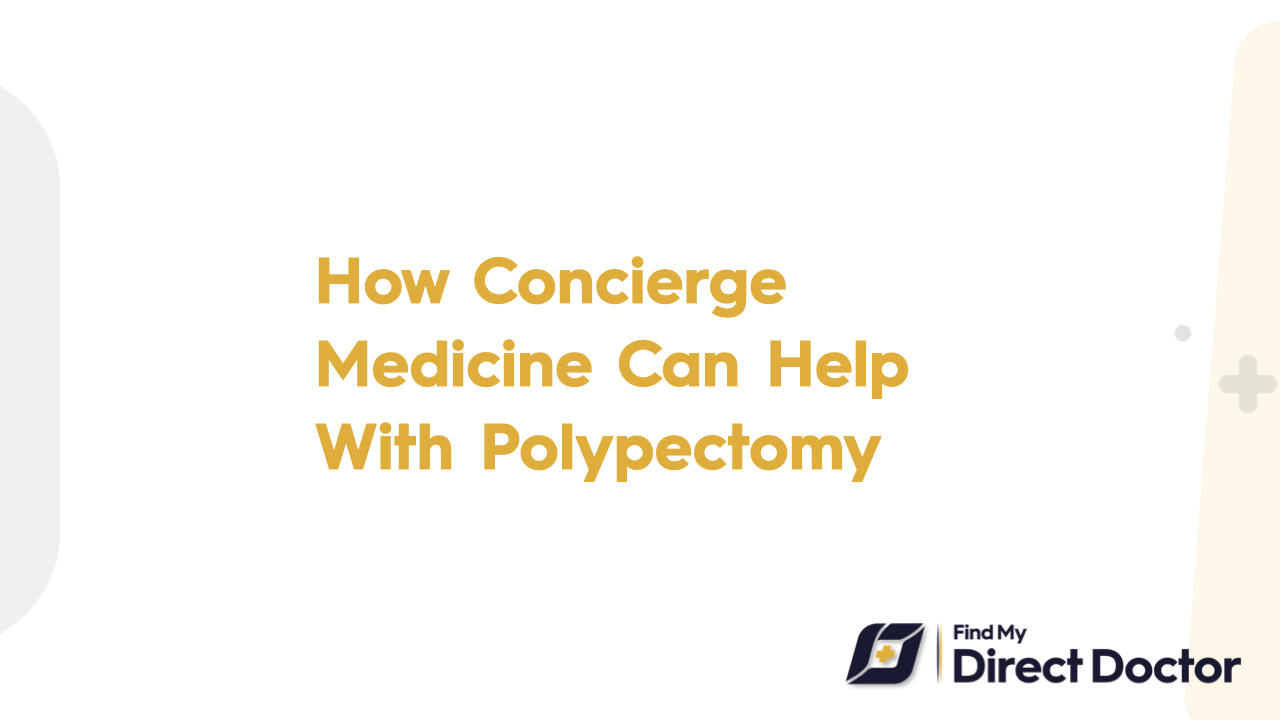



It involves removing polyps, which are abnormal growths of tissue that can develop in various parts of the body, such as the colon, stomach, uterus, and nasal passages. While many polyps are benign, some can be precancerous, making their removal an important preventive measure. If you are undergoing a routine screening or you are experiencing symptoms that require intervention, a polypectomy can be a straightforward but crucial procedure. It, however, requires careful planning, execution, and follow-up care to ensure the best possible outcome. Concierge medicine, with its personalized and comprehensive approach, can help enhance the patient's experience throughout the process.

It allows patients to receive more detailed and personalized care through a close relationship with their physician. Those undergoing polypectomy can benefit from this because their preparation, procedure, and recovery can be tailored individually. By providing patients with the attention and care they deserve, concierge medicine reduces anxiety and improves overall outcomes, from initial consultations to post-procedure follow-ups.
Patients who undergo polypectomy can benefit greatly from concierge medicine because it offers individualized care. Concierge medicine emphasizes a patient-centered approach, unlike traditional healthcare models that may make patients feel like just another number. Before developing a treatment plan, the physician takes the time to understand the patient's medical history, lifestyle, and specific concerns. Personalized attention can make a significant difference, especially for patients with unique health concerns.
A concierge physician is also more accessible to patients who undergo a polypectomy. Patients can contact their doctor directly for any questions or concerns they may have before or after the procedure. Having this level of communication can be extremely comforting, especially when dealing with medical uncertainties. The assurance that their physician is just a phone call or message away can help alleviate stress.
Concierge medicine also provides continuity of care, which is another key benefit. Patients may see different doctors during various stages of their treatment in traditional healthcare settings, which can lead to a lack of communication and care. Conversely, concierge medicine enables consistent care from the same physician throughout the entire process. By maintaining continuity, the doctor is fully aware of the patient's medical journey, resulting in better decisions and care.
Concierge medicine can also offer more flexibility in scheduling, which is particularly useful for patients who are busy or who have specific scheduling requirements. Concierge medicine can accommodate patients' schedules more effectively than traditional healthcare models, whether it's scheduling an initial consultation, the procedure itself, or follow-up appointments.
This preparation phase of a polypectomy is critical, as it sets the stage for a successful procedure and recovery. This preparation is highly personalized in concierge medicine. Prior to the procedure, the physician ensures the patient is in optimal health by reviewing his or her medical history, current medications, and potential risks. Taking a proactive approach to preparation can help concierge physicians minimize complications during and after polypectomy.
Besides medical preparation, concierge physicians also educate patients. Understanding the procedure, including what to expect before, during, and after the procedure, reduces anxiety and ensures that patients are fully informed. Pre-procedure instructions include dietary restrictions, medication adjustments, and any other necessary information. Patients feel more confident and prepared for their polypectomy when concierge physicians provide clear and personalized guidance.
Concierge medicine excels in providing tailored post-procedure care following a polypectomy. After the polypectomy, patients are closely monitored and followed up to ensure that their recovery is going smoothly. If the patient experiences unexpected symptoms after the procedure, the concierge physician remains available for any questions or concerns.
Moreover, concierge medicine allows for a more tailored recovery process after surgery. In the case of a colon polypectomy, for example, specific dietary recommendations or guidelines may be needed to manage digestive discomfort. The doctor may provide personalized advice on breathing exercises or managing discomfort if the procedure was performed in the nasal passages. By providing individualized care, a smooth recovery is ensured and complications are reduced.
A key aspect of concierge medicine is the emphasis on holistic care. Aside from the physical aspects of recovery, concierge physicians often address the emotional and psychological well-being of their patients. Medical procedures, no matter how routine, can be stressful. In addition to offering support and resources to patients coping with anxiety or stress, concierge physicians check in on their patients' emotional state.
As a result of the close relationship between concierge physicians and patients, long-term care planning can also be improved. If the patient is at higher risk of recurrence of polyps, the physician can work with him or her to monitor their health. As a result of the ongoing care and monitoring provided by concierge medicine, patients are able to maintain their health and well-being long after the procedure has been completed.
If a patient undergoes a polypectomy, concierge medicine provides a unique and valuable approach to care. In concierge medicine, patients receive the highest level of attention and support throughout their surgical journey by providing personalized, continuous, and holistic care. By providing emotional and psychological support during such a significant procedure, this approach helps optimize outcomes, reduce complications, and reduce complications. Concierge medicine can have a profound effect on the experience and well-being of patients facing a polypectomy.